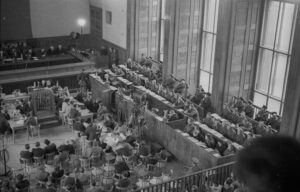The Greater Twin Cities United Way awards $12.1 million in grants to increase the economic security of low-income residents.
Reducing poverty is the No. 1 objective of the Greater Twin Cities United Way in awarding $12.1 million in grants that were unveiled Wednesday.
“A growing segment of our population is not set up for success,” said Acooa Ellis, United Way’s senior vice president of community impact.
In an interview with Twin Cities Business, Ellis and John Wilgers, United Way president and CEO, emphasized that people of color are disproportionately affected by poverty, which is why it’s crucial to support nonprofits with a history of getting positive results in diverse communities.
United Way allocated $10.5 million of its grant funds to 89 nonprofits that have experience in addressing housing, food, child care, education and workforce needs.
The 89 nonprofits were chosen for three-year operating grants. The $10.5 million will fund year one of the grants, which begin on July 1. Wilgers said United Way intends to make the same size grants in years two and three.
“There’s a growing body of research that suggests that outcomes for individuals are deeper, more positive and lasting when they are served through a culturally specific or culturally relevant lens,” Ellis said. Many of the organizations that were funded are led by people of color.
In 2019, United Way announced multi-year operating grants that totaled $14 million for 95 nonprofits. Nearly two-thirds—61—of those grantees also will receive grants in the 2022-2025 cycle.
Wilgers acknowledged the decline in local United Way funding for operating grants. Over several years, workplace campaign donations to United Way organizations have fallen across the United States. Sarah Caruso, former president and CEO of the Greater Twin Cities United Way, discussed in a 2017 TCB interview how an increase in designated gifts to specific nonprofits and other factors affected United Way’s operations.
Wilgers, a former EY executive who became the top leader of United Way in 2019, said that the Twin Cities organization has been going through a “transformation” in “the way we work in community, the way we raise money, and our desire to diversify our sources of revenue.”
During the 2020 racial reckoning that unfolded in the aftermath of George Floyd’s killing by Minneapolis police, Wilgers said that United Way would place an even higher priority on equity and racial justice issues.
“United Way has been committed to really serving those in our community where the needs are greatest,” Wilgers said this week. “We have been talking about the fact that our work is led by our commitment to equity. These grants are a reflection of that, particularly with respect to racial equity.”
Investing in children
Beyond awarding operating grants, Ellis said she’s excited about the impact that United Way will have through two innovation initiatives that are aimed at young children and teens.
“The 80X3 and the Purpose Driven Paycheck Career Academies are reflective of what we understand to be gaps” in service, Ellis said.

United Way’s 80X3 initiative draws its name from research that indicates 80 percent of brain development occurs by age 3. Early childhood trauma can impair brain development and negatively affect brain functioning into adulthood.
Wilgers said that United Way has allocated $1.2 million to its 80X3:Resilient from the Start initiative.
That money will go to early childhood providers to increase their ability to provide trauma-sensitive care for children up to age 3 and their families. In announcing this initiative, United Way said this funding will “support an intensive year of training, coaching, peer learning, and organizational change focused on addressing early childhood trauma through healing-centered and resiliency-focused approaches.”
Nine nonprofit programs will receive grants through the 80X3 program. They are: Amherst H. Wilder Child Development Center; Baby’s Space: A Place to Grow; Catholic Charities Northside Child Development Center; Centro Tyrone Guzman; Hallie Q. Brown Community Center; People Serving People Center of Excellence; Phyllis Wheatley Community Center, and The Family Partnership’s Four Directions Center and its Northside Center.
United Way also is extending its funding commitment to Career Academies through a $400,000 award. In May, United Way intends to fund eight to 10 partnerships between schools and businesses.
Through this program, United Way said it wants “to build equity-centered career pathways for grades 9 to 14, ensuring students have access to meaningful work experiences, college credits with zero debt, and wealth-building careers.”
Evolving United Way
While many United Way contributors know the nonprofit organization through its workplace giving program, United Way has been evolving over a period of years.
That includes everything from its revenue model to its funding criteria, its relationships with grantees, and its provision of direct services to the public.
“We’re in active partnership with all of our grantees to better understand how they are thinking about success, how they are measuring it, what they are seeing works, and learning, listening, and co-creating and improving along the way,” Ellis said. “There is so much of that that’s embedded in all of these grants.”
Wilgers also highlighted the fact that United Way has become an important provider of information to people who need to connect to community services.
United Way’s 211 resource helpline team has grown to 75 people. That group consists of a director, 32 permanent staff, and 42 people who are temporary staff and work on RentHelpMN.
Also, 16 people are deployed to staff the Suicide Prevention Lifeline.
Precisely what United Way funds and staffs varies from year to year based on the revenue that flows into the organization. In addition to being a funder of nonprofits, United Way itself receives some government grants.
On its most recent filing of its federal Form 990, the Greater Twin Cities United Way reported $57.7 million in revenue for calendar 2020. The money that was generated in 2020 was used to fund grants in 2021.
“While 2021 results are still preliminary, we expect revenue to be stable, showing a slight increase from 2020,” Wilgers said. “Accordingly, expenses, including our investments in community, are expected to be slightly up in 2022.”




